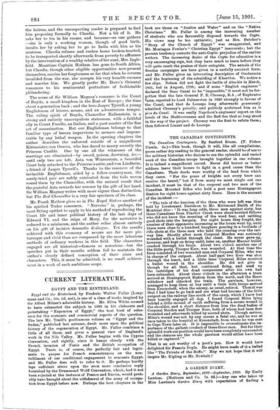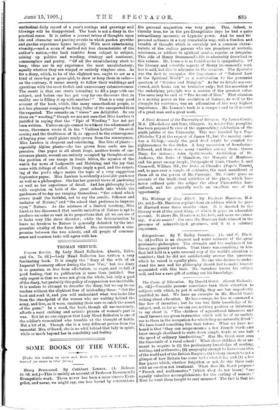A GARDEN DIARY.
methodical daily record of a year's sowings and growings and blowings will be disappointed. The book is not a diary in the practical sense. It is rather a journal intime of thoughts upon life and character and passing events in which garden growths and-garden experience figure largely. With most entertaining vivacity,—and- a scorn of method not less characteristic of the author's nation,—the book rambles from subject to subject, mixing up politics and weeding, strategy and sentiment, commonplace and poetry. "Of all the unsatisfactory stock to keep,' ideas are in my experience the most unsatisfactory; equally whether they are winged or entirely wingless ones. As for a diary, which, to be of the slightest use, ought to act as a kind of crow-boy or goose-girl, to show or keep them in order— on the contrary, it seems merely to follow their waddlings and gyrations with the most foolish and unnecessary submissiveness- The result is that one starts intending to fill a page with one subject, and before one has got very far one discovers that in reality one is filling it up with another ! " That is a very good account of the book, which, like many unmethodical people, is not less pleasant company for being fuller of the unexpected than the expected. The remarks on " views" are delightful. So are those on " weeding," though we are not sure that Miss Lawless is justified in saying that the " Epic of Weeding " has not yet been written. Unless an epic cannot be without the adornment of verse, Stevenson wrote it in the " Vailima Letters." On seed- sowing and the thriftiness of it, as opposed to the extravagance of buying your small plants ready-grown from the nurseryman, Miss Lawless is eloquent and convincing. Her lists of plants— especially Alpine plants—she has grown from seeds are im- pressive. One paper is all about frogs, another treats of car- nivorous plants, several are entirely occupied by thoughts about the position of our troops in South Africa, the agonies of the watch for news of Ladysmith and Mafeking, and the joy that came with tidings of relief. Frogs imply a pool, and the carpet. ing of the pool's edges makes the topic of a very suggestive September paper. Miss Lawless is evidently a bona-fide gardener as well as a philosopher. She has her general views of gardening as well as her experience of detail. And her philosophy looks with suspicion on both of the great schools into which the gardeners of to-day are ranging themselves "the school which avows itself the faithful, not to say the servile, follower and imitator of Nature," and "the school that professes to improve upon" Nature. As the mistress of a limited territory, Miss Lawless has discovered that servile imitation of Nature is apt to produce an order so vast in its proportions that all we can see of it looks very like sheer disorder; while the determination to leave no freedom to Nature is generally defeated by the irre- pressible vitality of the force defied. She recommends a com- promise between the two schools, and all people of common- sense and common taste will agree with her.











































 Previous page
Previous page